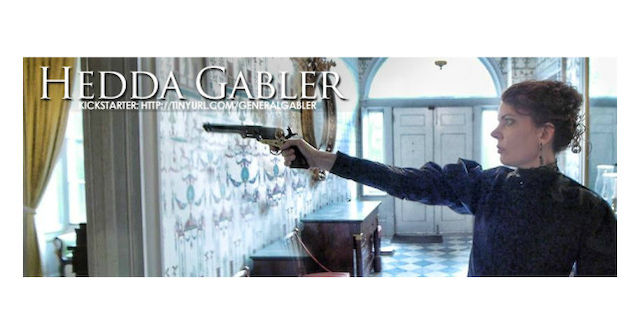 Hedda Gabler: Digital Native
12/12 '15
Hedda Gabler: Digital Native
12/12 '15

I first saw a performance of Ibsen's Hedda Gabler on the London stage in 1989. And I saw what everybody saw, in 1989: a modern woman marooned in 1890, acting out in desperation because she was denied the opportunity to develop as an individual. It's a fine reading of the play.
But tonight I saw the play again, in 2015, performed at Philadelphia's Physick House. And I saw something very different. I saw a human being marooned in 1989. Marooned without the Internet. (*)
The feminist reading is straightforward enough. While her father was alive, Hedda lived an independent, privileged life. She was largely sheltered from the harsh reality that women had limited control over their own lives in 1890. She is surrounded by women who are fulfilled in caretaker roles, whether they got to choose them or not: as servants, sisters, nurses. But she wants to be an adventurer, a bon vivant, the center of her social circle. And once she has been dragged into marriage, through the agency of a white lie grown unchecked, she has no more choices left. None but one.
But what about 2015? In 2015 this play is about a human being deprived of Facebook. In 2015, Hedda Gabler is almost a horror movie, where the monster is 1989.
Yes, 1989: it was a time when you had to sit on the couch and share the remote with your immediate family. All night. Every night.
True, in 1989 you might escape into a book, or a video game, or certain early online activities. But alas, poor Hedda: she is not a bookworm. Her talents are social. She shines among friends.
And our social animal must endure a six-month honeymoon, in a country where she knows no one. She is forced to talk to the same person, all day, every day. She cannot even flee to the bathroom to check Facebook or Snapchat for a few seconds. There is only this: only her husband. Every minute of every day. Horror movie. Cue creepy music.
Is she lonely because she does not speak the language? No, Ibsen hints at something far more specific. Her prime complaint:
"To go for six whole months without meeting a soul that knew anything of our circle, or could talk about the things we are interested in."
Ponder how strange this is to imagine today. We are, every day, the President of our own fan club. We are never, ever away from "our circle" except by choice. OK, maybe for a two-week honeymoon. But for six months?
Hedda is a piece of work in many ways, and there are many threads that make up her downfall. Some feel devastatingly relevant today; some are a bit too melodramatic, but great fun in the right hands. But to me, in 2015, this stands out: as her father's daughter she had the Facebook friends she wanted, and took for granted that she could write on their walls any time she wanted, check for updates any time she wanted. And then: all gone.
All gone but one, and he holds a nasty bit of leverage over her; her snapchats will not erase themselves.
Everyone else has their place in the social order, or stumbles into a new one, despite her machinations. But Hedda has none, and she can't just go on okcupid and start over. Of course she has only one choice.
The past is a cruel place. Cue spooky music.
"But apart from that, Mr. Boutell, how was the play?" Very fine indeed. Just to touch on a few highlights:
Photographer Kyle Cassidy, as producer, somehow made this thing happen in Philadelphia's historic Physick House. You are right there bang in front of the actors in a sitting room. It's intense in a good way. And there will be a film of the play, too.
Naturally this all happened because of the Internet. And a kickstarter. And blood, sweat and tears, of course.
Jennifer Summerfield simmered gloriously as Hedda. Each micro- and not-so-micro-aggression came through with nuance and range. The melodrama that does tend to overwhelm the text at times never prevented her from connecting honestly with the audience.
Every time Hedda stopped working overtime to charm someone, she radiated an anger that said "I may have signed up for this, but it is not what I want. And I will never, ever accept it."
Adam Altman, as Hedda's new husband, plays the part of the self-absorbed nerd to perfection, enthusing about his research every time his aunt pleads for the slightest hint that they might be in a family way. And I say this with affection as a self-absorbed nerd. But even he can access family feeling, and so has a secure place that Hedda cannot reach.
Speaking of the aunt, Tanya Lazar's reading is also spot-on. Juliana Tesman lives through caring for others; she lives through family.
Of course she does. What else is there?
Well... what else was there? Now we have families of choice. Tribes of choice. Infinite overlapping personal fan clubs.
But shouldn't family, whether of origin or of choice, still be the most important thing? Yes, yes, of course. Hedda is an extreme case. But excuse me for a moment while I step into the other room and peek at my phone for a glorious minute. A guy can only take so much togetherness. Brr. Cue spooky music.
Tickets are still available. Playing through Sunday, December 20th.
(*) Yes, I know the Internet existed in 1989. And I personally had access to some of the escapes I'm talking about as early as 1986. But most people didn't, and their friends certainly didn't, and a social network without the people you know isn't really The Social Network yet.

